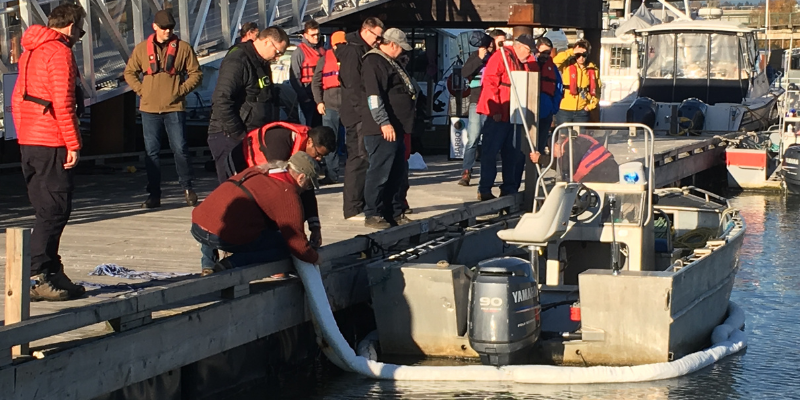
Clean Marine BC helps boaters and marinas prevent and clean up spills
For more than 20 years, GSA has run the Clean Marine BC program which works with boating facilities to reduce the impact of recreational boating on the Salish Sea and beyond through the implementation of improved environmental measures, including waste reduction, water and energy conservation, and spill preparedness and response. As part of that program, GSA also offers marine spill response training.
As President of False Creek Fuels, a fuel dock adjacent to the south side of the Burrard Street Bridge in Vancouver, Michael Short has taken our Clean Marine BC marine spill response training three times, so we wanted to find out why.
“I want as many staff as possible to learn as much as they can so that if there is a spill – large or small – that they know how to respond quickly, efficiently and safely” – Mike Short

Mike Short (2nd from left) looks on as spill boom features are being described. Image: Michelle Young
“There’s so much value in learning from people who have been doing spill planning and training professionally. I want as many staff as possible to learn as much as they can so that if there is a spill – large or small – that they know how to respond quickly, efficiently and safely,” says Mike, who has taken the training program in person, as well as online during the pandemic.
At False Creek Fuels, recreational boaters fill up their own tanks, with supervision from Mike and his staff. “We’re there to coach our customers to avoid spilling, making sure that people are doing best practices.”
According to Mike, taking the course annually gives him a refresher that keeps the skills top-of-mind, which helps when he trains his summer staff. “Also, things change – an accident could have happened somewhere that we can learn from,” he says, adding that the CMBC trainers have in-depth industry experience, are familiar with the nuances of regulation and how it applies to any operation, as well as having good practical advice.
Mike says the most common incident with refuelling is the “burp”, which is when a little bit of fuel goes into the water due to over-filling or filling too fast. “Because we took the course, we know what to do. We’ve never had a major spill but we have used spill response materials for prevention and small spills,” says Mike.
Because we can’t control every situation as much as we’d like to, Mike considers spill training a valuable prevention tool. “This course prepares you in case something has gone in the water, and what’s the best way to deal with that? What tools does your facility have, if any? This course prepares you in case something has gone in the water, and what’s the best way to deal with that. When they put the course on again, I’ll be there.”

Image: False Creek Fuels
Header image: Spill training at Deckside Marina. Image by Michelle Young.

Hi There,
In early May I will be holding staff training for about 25 of our marine guides about to run trips along the BC coast this summer. Bluewater Adventures is an ecotourism company and we take our environmental responsibilities seriously. I would be very interested in including some spill training. Can you put me in touch with the person who runs your spill training to find out if something can be arranged?
Hi Randy! Check your inbox, as I sent you an email. Thanks.